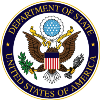Celebrating Hispanic Heritage Month: Profile of A Diplomatic Security Special Agent
The Bureau of Diplomatic Security (DS) is honored to celebrate National Hispanic Heritage Month by highlighting what one DS special agent brings to the bureau and the State Department.
In a recent Q&A, Orlando Velasquez, deputy director for DS’s High Threat Programs-Afghanistan, reflected on his work in the bureau, his 16-year career with the State Department, and his proud Mexican heritage.
Describe your typical day as deputy director for Afghanistan in DS’s High Threat Programs Directorate.
My work demands are constant, regardless of the day. In order to stay current on threats and issues related to Afghanistan, the first thing I look at upon waking at 5:00 a.m. is my Blackberry, and the last thing I see before going to bed is my Blackberry.
A normal day is usually pretty hectic, but if there’s an insurgent attack in Kabul targeting western interests, my team and I go into overdrive. We are in constant communication with the Regional Security Office (RSO) in Kabul — taking account of our personnel; assessing injuries and damage; and pushing information to State Department decision makers.
If there’s a direct impact on U.S. Embassy Kabul properties, my office will coordinate the Department’s response for short- and long-term security assistance. On many weekends, I’ve had my Blackberry and earbuds in while speaking with RSO Kabul while walking our dog or out to dinner with my family. This level of continuous attention is critical to our work in High Threat Programs, and the field deserves nothing less. For me, it’s a labor of love.
How did you become a special agent?
While studying at the University of Texas in Austin, I applied to Diplomatic Security as well as the National Imagery and Mapping Agency, which is now the National Geospatial Agency. I had two choices: see the world from my desk, or actually see the world. Joining DS was one of the best decisions of my life.
Describe your heritage.
While I consider myself a Texan, I’m of Mexican descent and heritage. My parents were born in Texas and have been the biggest influencers in my life. I was raised in a culturally rich household with a tight-knit family, and my parents instilled a very strong work ethic in me, along with a healthy dose of fear and respect. I owe them everything.
Have you experienced equal opportunities for promotions and advancements in the State Department?
Honestly, I don’t know. I have been afforded opportunities and promotions based on merit, and I wouldn’t have it any other way. In my current assignment, you either have the qualifications it takes to succeed, or you don’t. This is not a position the Department can afford to trust to an individual who does not have the right credentials. I feel honored that DS leadership is confident of my ability to manage our Afghanistan program, regardless of my heritage.
How does your heritage enrich what you do at work?
Hispanic heritage places an emphasis on family, relationships, and respect, among other traits that are useful in diplomacy. While I was posted in Croatia, an RSO employee made a critical mistake with one of our most senior and toughest Ministry of Interior contacts, which caused a tremendous amount of anger on his part.
I made an appointment to pay our penance. As we settled in his office, his stern scowl set a dark tone. I requested permission to ask a very important question before starting; he agreed. I asked about his very sick mother, then about how his father was handling the situation, because I was genuinely concerned. His anger immediately dissipated, and most of the meeting was about our parents. We quickly reached common ground, and even strengthened our friendship. Effective diplomacy is the genuine ability to empathize and listen. Due in large part to my heritage, it comes naturally to me.
Is the State Department a good place for minorities to work?
State has allowed me to grow and prove my worth through hard work and tenacity, so, yes, it’s been a great place to work. During the time I served on the DS Diversity Working Group, I learned how much passion individuals bring to this topic, such as recruitment and retention and cultivating an inclusive work environment. It was a great platform to convey my opinions on diversity, and, just as importantly, to hear other people’s perspectives, which broadened my understanding of the issues.
Do you have any advice for other people of Hispanic descent?
I will say what I say to my niece and nephew. Never forget where you come from and never let go of your heritage. Earn your place in life through hard work, talent, and perseverance. And remember, the only fair in life is the one held at the edge of town.
About the Author: Suzanne K. Whang serves as a Public Affairs Officer in the Bureau of Diplomatic Security at the U.S. Department of State.
